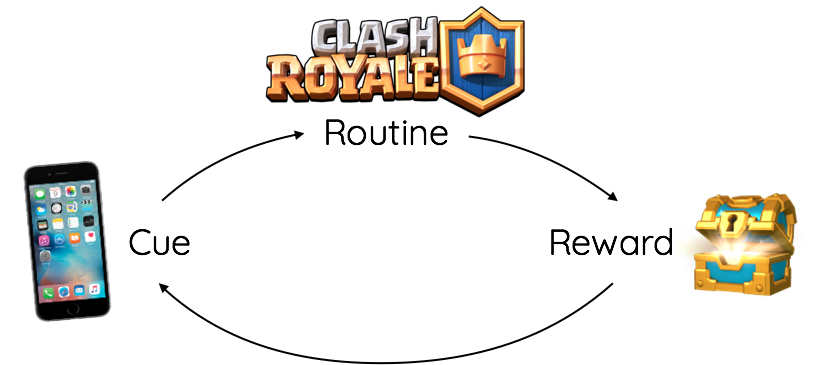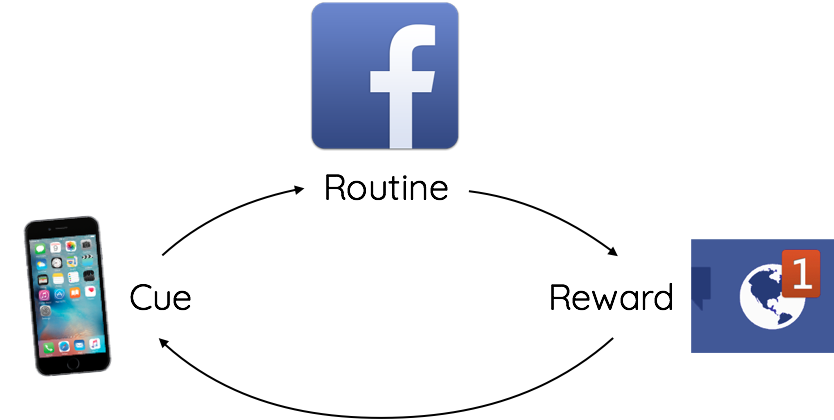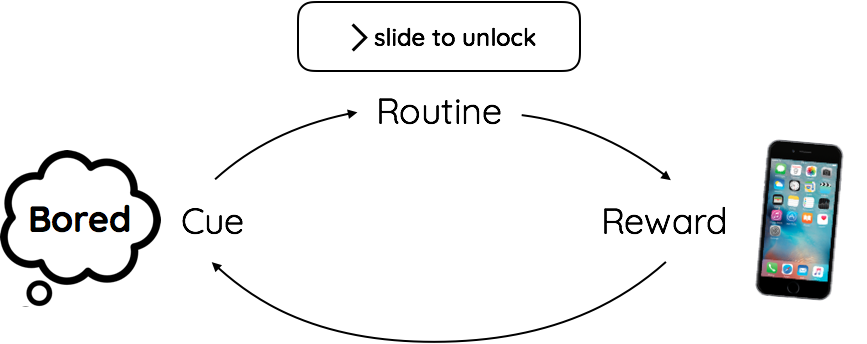The habit loop: Powerful habit-forming mechanics found in Clash Royale
have a bad habit of pulling out my phone and playing the game Clash Royale whenever I have a spare moment. This habit is so ingrained in me I find myself automatically doing it, even when I was supposed to be doing something else on my phone. It's got to the point where I need to deal with it, and what better way to do that then by writing a blog post about it as an excuse to play it... I mean analyse it... even more.
The Habit Loop
In his book, The Power of Habit, Charles Duhigg looks at the science of habits. He explains that at the core of every habit there is a simple neurological loop that consists of three parts: A cue, a routine and a reward.
The cue is anything that triggers the habit. This could be a an emotional state, a time of day, a location, or an immediately preceding action. For example, as soon as I arrive at work in the morning I make and drink a coffee. Arriving at work is the cue in this case.
The routine is the behaviour we undertake. For my coffee example, it's the making and drinking coffee which is the routine. We're ultimately interested in how we can change bad behaviours, or reinforce good behaviours.
The reward is why we have ingrained the habit in the first place and it provides positive reinforcement for the behaviour we undertook. In my example, the reward is the hit of caffeine I get from drinking the coffee. Rewards can vary greatly, for example I could also be making coffee for a temporary distraction from work, a change of scenery, or the chance to socialise with colleagues. The more we reinforce this cue-routine-reward loop the more we go into autopilot mode, not even thinking about what we're doing. As we associate cues with certain rewards over time we also begin to create a subconscious craving in our brains that kickstarts the habit loop and we start anticipating the reward. This is one of the reasons why habits can be so difficult to change.
It also doesn't help when the routine is reinforced by some powerful mechanics in the first place that encourage us to form habits - like those found in casual games.
The rise of casual games
Casual games have become incredibly popular over the last decade thanks in particular to social media and smartphones. A casual game is generally a game that usually targets a mass audience, has a low bar of entry and doesn't require long periods of commitment to play. Think Farmville, Plants vs. Zombies, Mafia Wars, and Clash of Clans. We've seen a massive increase in the number of casual games available to us over the last decade, in particular on smartphones. Because of this these games are having to compete for our attention and as such, they have some of the most powerful habit-forming mechanics found in games.
Let's look at a more recent and very popular casual game in particular, Clash Royale. Why Clash Royale you ask? Because I'm totally addicted to this game at the moment and this blog post is just an excuse to try and help me break the habit of playing it whenever I unlock my phone...
Powerful habit-reinforcing mechanics in Clash Royale
Clash Royale is a mobile game released by Supercell in 2016. It successfully combines elements of collectible card games and multiplayer online battle arenas (MOBAs). You have three towers you need to defend, and you can spend elixir to play troops to attack your opponents towers and defend your own. The video below gives you a better overview of how gameplay works.
What's incredible is that Clash Royale spent 130 days as the #1 grossing game in the US and help contribute to the US$967 million in earnings that creators Supercell brought in that year (source - Reuters). So how did they do this?
First up, it's super easy to play and each game doesn't take long, about 3 minutes. This is a great start - it's engaging gameplay, well balanced and there's plenty of progression in terms of unlocking new cards that you can then use in your deck. However, it's how you unlock these cards that helps create a habit loop that is hard to break out of. To do this Clash Royale successfully uses a combination of the following mechanics.
Timed treasure chests
Every time you win a match you receive a treasure chest. However, you can't unlock this chest immediately - you have to wait a certain amount of time before it can be unlocked. The amount of time depends on the rarity of the chest, silver chests take 3 hours, golden chests take 8 hours and rarer chests take even longer (up to 24 hours).
One CHEST at a time
You can only unlock one chest at a time as well. This means you need to come back into the game to open your chest and then queue up another to unlock.
Limited Capacity
Clash Royale limits the number of chests you can have at any one time. It provides 4 chest slots, meaning that if these are full then you can't win any more chests until one of them has been opened and removed from a slot. This encourages you to come back and open them regularly.
Intermittent reinforcement
Then there is the excitement of opening a chest and seeing what you get from it. Before you open it you're not sure what exact cards you'll receive in a chest, you might receive a common card you already have or you might receive a brand new legendary card that's incredibly difficult to find. Clash Royale doesn't give you the ability to purchase any card you want, so many of the rarer cards need to be found by unlocking chests. This means that there's always a chance you'll get a great card when opening some chests which acts as intermittent reinforcement.
Bonus chests
One more nice mechanic they've included is bonus chests. You can come back every four hours to open a free wooden chest. Also, for every enemy tower you defeat you receive a crown, collect 10 crowns to unlock a crown chest. This means that even if you don't win any games, you still have a timed chest to unlock.
Creating the habit loop
So all of these mechanics work together to help form a habit loop. During the day you'll find yourself winning chests and then coming back to the app in 3 hours or so to unlock the chest. It doesn't take long to then win a game and queue up another chest to unlock. If you haven't got a queued chest you can still unlock the free chest, or you can aim to unlock the crown chest. If it's right before bed you might queue up a chest that takes longer (e.g., 8 hours) so you can unlock it first thing in the morning when you wake up. Soon enough, you might find yourself like me - opening Clash Royale every time you use your phone just to check if there's a chest to unlock (or to try and win another chest) and by that point, the habit loop has well and truly been established.
Combine this with the other engaging aspects of the game - it's easy to learn, hard to master, battling to move up to new arenas to access new types of cards, joining and helping your clans, and so on and you've got one super engaging game!
You can also pay 'gems' to unlock chests and this is one way in which Clash Royale makes money. You can purchase gems and use them to fast track chest opening. But then of course there's always more chests to open.
Escaping the loop
After identifying this habit I've managed to break it. There are a number of ways I could have done this but I found the easiest way for me was simply to delete Clash Royale from my phone. It was tough, and I found myself looking for the app icon whenever I opened my phone.
The only problem with deleting the app was that I simply replaced routine with a different app - Facebook. The cue was still the same, however a new routine and reward occurred. I'd open Facebook and be rewarded with content and possibly notifications (which can act as a form intermittent reinforcement). Not a great alternative as I was still wasting time.
So I deleted the Facebook app... and of course replaced it with another app Hearthstone. Which was even worse, as this game takes longer to play than Clash Royale which meant I was wasting even more time.
Taking a step back and thinking about it even further I realised that there was actually another, bigger habit loop at play here that I needed to change. Can you guess what it is?
Basically, whenever I was bored or had a spare moment, this would act as a cue to then open my phone up and be rewarded by whatever app I chose to check.
This is a harder habit to change which I need to work on. The BBC have a great podcast on this exact topic which is worth listening to. In the interim I've deleted Clash Royale & Facebook and I now open a To Do list app instead. This way when I find myself opening my phone out of habit the first thing I look at is the list of tasks I have to get done today. This then acts as a cue in itself to guide me back to my work.
Wrapping up
Okay, so we touched on some of the habit forming mechanics found in Clash Royale. These are just a few of the things which make Clash Royale so popular, and you can see that through the careful combination of timed, limited and variable rewards you can encourage habits to be formed. These same mechanics can be used in your own gamification designs as well.
The only problem now is that my friend Jimmy Ti tells me of a feature in Clash Royale that I totally missed. Which means I'm going have to download it again in order to see what the fuss is about. I guess that means you'll probably see another blog post coming along soon to justify me playing it again. 😅
Anything to add?
Do you play Clash Royale? If so does this sound familiar to you? Or have you got a game or app related habit that you want to share? Feel free to post any comments below or get in touch with me to tell me about it.
Mentioned in this post
Clash Royale
This game can be found on the Apple App Store and Google Play Store. Be warned though... it is addictive!
The Power of Habit: Why We Do What We Do in Life and Business by Charles Duhigg
In The Power of Habit, Pulitzer Prize–winning business reporter Charles Duhigg takes us to the thrilling edge of scientific discoveries that explain why habits exist and how they can be changed. At its core, The Power of Habit contains an exhilarating argument: The key to exercising regularly, losing weight, being more productive, and achieving success is understanding how habits work. As Duhigg shows, by harnessing this new science, we can transform our businesses, our communities, and our lives.
Why can't we stop looking at our phones? BBC World Service - The Inquiry Podcast
Wondered why we spend so much time using our phones everyday? The Inquiry podcast explores this in one of their episodes - definitely worth a listen.







